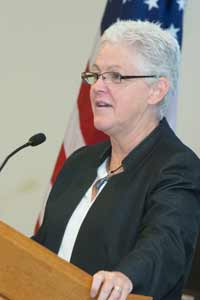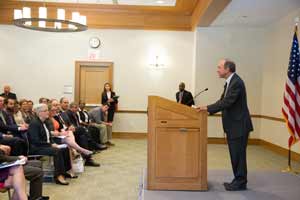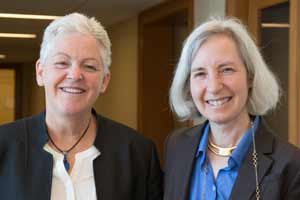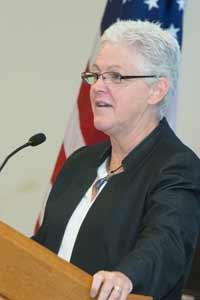
This article was originally published in the Harvard Gazette on July 30, 2013.
Newly confirmed Environmental Protection Agency Administrator Gina McCarthy on Tuesday pledged action on climate change during the Obama administration’s remaining years, saying the concern is as much economic as it is environmental.
“Climate change will not be resolved overnight, but it will be engaged over the next three years; that I can promise you,” McCarthy said during her speech at Harvard Law School (HLS).
McCarthy, confirmed to head the federal agency on July 19 after a bruising Senate review process, decried what she called a “false choice” between environmental health and economic health presented by those who oppose regulation. She pointed to the U.S. economy’s growth over the decades since landmark environmental regulations were passed in the early 1970s, and held up clean air and brownfield cleanup programs, both administered by the EPA, as examples.
McCarthy also held up the cleanup of brownfields—polluted urban lots that are often former factory or industrial sites—as another way that government anti-pollution action has benefited the economy. Since 1995, government-sponsored brownfield cleanups have returned 41,500 acres to development, generating 93,000 jobs and leveraging $20.8 billion in economic development, she said. Each dollar spent on the EPA’s brownfield cleanup program, McCarthy said, leads to between $17 and $18 in public and private funds for cleanup and development.
![[L-R]: Kate Konschnik, Wendy B. Jacobs, Shaun A. Goho, Gina McCarthy,, Richard J. Lazarus, Howard J. and Katherine W. Aibel, HLS Dean Martha Minow](https://hls.harvard.edu/wp-content/uploads/2023/12/epa-inside4-wd.jpg)
“This is how you use federal dollars to advance the public interest. That is what EPA is all about,” McCarthy said. “The EPA is having substantive positive impact on the lives of everyday people all across the United States, and we’re doing so in a way that not only doesn’t slow the economy, but in many ways that spark economic growth.”
McCarthy delivered her comments before 300 people gathered at Wasserstein Hall. Dean Martha Minow introduced the talk, billed as McCarthy’s first public policy speech since she was confirmed. The session was hosted by the Law School’s Environmental Law Program.
The event had something of a homecoming feel, as McCarthy, who was raised in Boston, was introduced by her daughter, Maggie McCarey. The new EPA chief previously worked as an environmental administrator for several Massachusetts governors, including Mitt Romney, and also served as commissioner of the Connecticut Department of Environmental Protection before moving to the EPA as an assistant administrator in 2009.
McCarthy’s confirmation process became a lightning rod for Republican disapproval of the Obama administration’s decision to pursue climate-change action through regulatory rather than legislative means. Under that strategy, the EPA can regulate carbon dioxide as it does other pollutants and move ahead with some actions without approval from Congress.
McCarthy was subjected to intense questioning by Republican senators, and was called back to the Senate 70 times over a 136-day confirmation period during which she answered more than 1,000 questions. House Republicans have expressed their own disapproval of the agency’s activities, proposing cutting the EPA budget by a third.
“Getting confirmed two weeks ago, it was truly the honor of a lifetime,” McCarthy said. “And that, I think, is a very good thing because I swear it took two lifetimes to get confirmed.”
Though much of the spotlight has been on the federal government, McCarthy said that it rarely leads in promulgating regulations. Instead, she said, it embraces effective examples set by an array of state and local governments, nonprofits, universities, businesses, and individuals.
In response to a question on the controversial proposed Keystone XL oil pipeline from Canada, McCarthy described her role as that of a mediator who tries to get all sides to work out their differences.
“It’s not supposed to be easy; it’s supposed to be hard,” she said.

McCarthy cited the devastating impact of Superstorm Sandy as an example of how environmental issues are at their core economic ones.
“I’m quite sure following Hurricane Sandy, no one looked at that hurricane as an environmental challenge; they looked at it as an economic devastation,” McCarthy said. “Climate change isn’t an environmental issue. It’s a fundamental economic challenge for us. It’s a fundamental challenge internationally, and we need to embrace that challenge.”
McCarthy said the agency is committed to working in partnership with diverse groups to clean up the U.S. energy system in a way that not only lowers emissions from climate-changing greenhouse gases, but that also stimulates the economy.
“Today, the truth is that we need to embrace cutting carbon pollution as a way to spark business innovation. We need to cut carbon pollution to grow jobs. We need to cut carbon pollution to strengthen the economy,” McCarthy said. “Head-on. That’s how we need to deal with this issue.”
-Alvin Powell/Harvard Staff Writer
Dean Minow highlights Harvard Law School’s Environmental Law Program

In her introductory remarks, Dean Minow highlighted the many ways Harvard Law School is addressing environmental and energy issues. Some excerpts below:
“Wendy Jacobs has built a fabulous (Emmett) Environmental Law & Policy Clinic (ELP) at the law school, engaging students in the practical problem-solving that the world needs more than ever. Students take on projects for local, state, and national clients. For example, with Wendy and Shaun Goho, the Clinc Staff Attorney, students drafted a wetlands policy and a procurement policy for the City of Boston, as part of the city’s climate adaptation efforts.”
“Students have researched municipal rights related to hydraulic fracking and published a guidebook to direct landowners entering into leases with unconventional oil and gas companies.”
“ELP launched a Policy Initiative, directed by Kate Konschnik. The Policy Initiative has already grown Harvard Law School’s presence in national environmental and energy debates.”
“Harvard Environmental Law Society won the bid for the 2014 National Environmental Law Society Conference. They will be hosting a conference on environmental justice issues, on the 20th anniversary of President Clinton’s Environmental Justice Executive Order.”
“We are housed in a university that takes sustainability efforts very seriously. Harvard has an ambitious plan to reduce its greenhouse gas emissions 30% from a 2006 baseline by 2016, including growth.”
